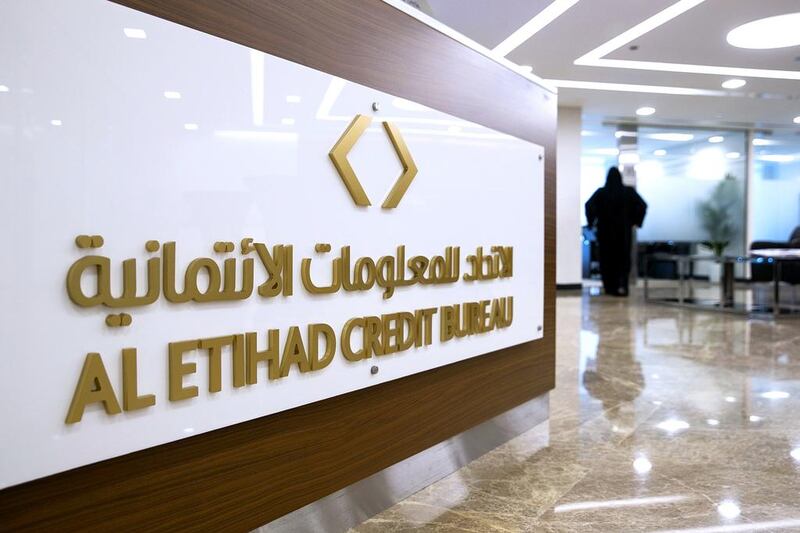While overindebtedness is becoming endemic in the UAE as residents struggle to make ends meet amid higher rates of price inflation, banks say the newly launched Al Etihad Credit Bureau will help to protect individuals from financial disaster.
Even though stories of people struggling to keep up with payments on their loans are common, overall loan growth in the UAE is still nowhere near the levels reached before the financial crash of 2008.
Abu Dhabi Islamic Bank, among the UAE’s bigger lenders, has a high exposure to consumer debt and has been one of the first to embrace the credit bureau. That is in part, analysts say, because it needs to make sure it knows how much money to set aside to cover the losses from those who default.
“If someone has 10 credit cards and he’s barely making ends meet, how do they service those credit cards?” asks Tirad Al Mahmoud, the chief executive of ADIB. “If they apply for credit card number 11 at another bank and they take that money to pay the payments due on the credit cards and buy some groceries for the house, that’s really excessive.
“With the credit bureau, this guy will not be able to get credit card number 11, and those 10 banks will discover that this person is in trouble and that he will have to restructure. Then common sense prevails and the right decisions are made.”
• UAE residents crushed by a mountain of debt - click here
Rejection rates on consumer loans have increased by 10 per cent at ADIB since it started using credit bureau data, Mr Al Mahmoud says.
Now he has warned that overindebtedness in the UAE will not be reduced until all banks start to use the recently launched credit bureau.
Designed to help keep credit growth in check and prevent consumers and corporations from overstretching themselves, Al Etihad Credit Bureau started operations last year. Since then, however, its progress has been slowed by concerns over the accuracy of its information and questions of legal liability. The UAE has one of the world’s highest rates of indebtedness at US$95,000 per household, banking executives said.
Jaap Meijer, the head of financial services research at the Dubai-based investment bank Arqaam Capital, says it is positive that ADIB is improving its lending standards ahead of any unexpected losses that the credit bureau may eventually expose.
“The credit bureau will avoid debt problems, as individuals won’t be able to exceed the maximum as set by the Central Bank by shopping around and having loans with multiple banks,” Mr Meijer says. “Banks will benefit from lending standards.”
Experience in other countries shows that credit bureaux can stop individuals with a poor credit history from amassing further debt while easing the flow of credit to those able to repay loans.
Banks benefit by having to build smaller provisions, or money put aside to cover bad debts against the risk of defaults.
The credit bureau opened for business in November, but concerns surrounding who would be responsible for incorrect data made some banks hesitate to use it initially. While that issue has been resolved, banks are not obliged to use the bureau when making lending decisions, says the head of the bureau, Marwan Al Lutfi.
The federal government passed a law in 2010 to establish the bureau, requiring all banks to participate in giving data.
The bureau’s database of the credit history of all retail borrowers enables banks to build an accurate picture of a potential borrower’s indebtedness, and allow them to assess their ability to honour the debt. Previously, banks could not check the credit history of customers relating to other lenders.
However, the presence of the bureau has so far had a great effect on the country’s indebtedness.
“I know some of the newspapers have said that there has been a decline [in loans] since the credit bureau started. A 35 per cent decline, which is not true – at least not across the board” says Mr Al Lutfi. “Overall, the market has actually increased.”
Most of that debt is in the form of personal loans and credit cards, and the average resident with debt has two loans, Mr Lutfi adds.
According to the latest figures available to Mr Lutfi, about 3.1 million residents have 6.69 million active loans. Both those numbers are up 10 per cent from the end of December, he says.
The data chimes with what banks have been reporting in their earning releases for the first quarter. Emirates NBD, the largest bank in the Middle East in terms of assets, said its first-quarter profit jumped more than 60 per cent as it made more money from individual customers through credit cards and international money transfers.
“When the credit bureau is in full operation, the extent of the transparency is going to be full. If there are pockets of people who are in deep indebtedness, that will be revealed,” says Mr Al Mahmoud. “The spotlight will come there. And I expect that some of us banks will find little unpleasant surprises when we look at that.”
Still, bankers say, things need to be put in perspective. Loan growth in 2008, the year of the financial crisis, was 41 per cent, according to data from the Central Bank. In the UAE this year loan growth is expected to be about 9 per cent, analysts say.
mkassem@thenational.ae
Follow The National's Business section on Twitter





